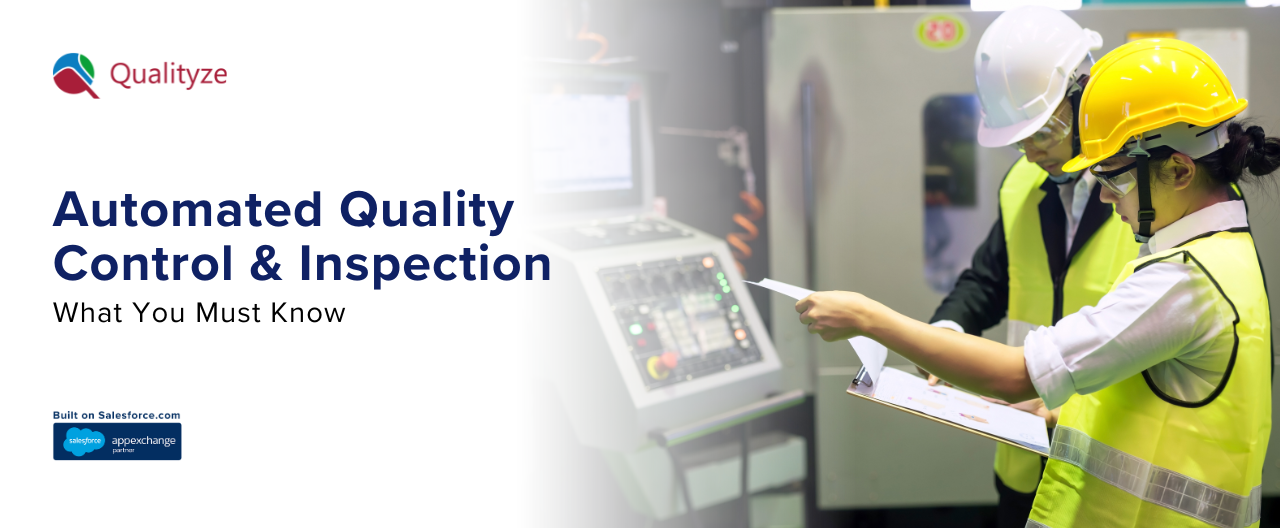

Calculate your potential savings with our ROI Calculator
ROI Calculator
Automated Quality Control is redefining how industries deliver accuracy, compliance, and customer trust.
As product quality makes or breaks a brand, business enterprises can no longer afford to stick only to conventional methods of inspection. Manual inspection, as much as it was precious in the past, is subject to human error, variability, and inefficiency. The increased need for quicker production cycles and perfect compliance has made an automated quality control & inspection system a necessity.
These systems utilize machine vision, AI, IoT, and robotics to detect defects with unprecedented accuracy and speed. Most importantly, they fit into the digital transformation initiatives most industries are embarking upon. Automated QC is no longer optional for organizations that serve heavily regulated industries such as life sciences, automotive, and electronics—it is a must to remain competitive and compliant.
Did you know? MarketsandMarkets predicts the automated inspection market to grow at a CAGR of more than 7% and reach USD 38.5 billion by 2028. This pattern reflects how automation is the emerging backbone of quality strategies today.
In this blog, we will discover the definition, scope, technologies, applications, benefits, compliance role, challenges, and future trends of automated QC, backed by real-world examples and actionable insights.
Automated quality control (AQC) is the application of technology-based inspection systems that examine, evaluate, and check product quality without human intervention. In contrast to human-dependent QC, automation promises constancy, eliminates variability, and facilitates real-time adjustments.
The extent of AQC goes beyond detecting defects. It encompasses:
This broad range makes AQC a strategic operational excellence and customer trust enabler.
Having learned what automated QC is, let's dig deeper to see why industries are quickly moving towards this model.
Today's industries are facing tremendous pressure—tightening delivery schedules, stringent compliance standards, and mounting customer expectations. Manual inspection just cannot keep up with these pressures.
The primary reasons behind this drift are:
Did you know? According to a Deloitte survey, 85% of manufacturers that invested in automation experienced better compliance and lower recall risks.
To see how these systems provide such accuracy, let's have a closer look at the fundamental technologies driving automated QC.
Automated QC is founded upon an integration of cutting-edge technologies:
Together, these technologies enable quality to be infused into every production step, instead of checked at the end.
With these technologies, it's not surprising that AQC has applications in various industries.
Automated QC is not restricted to a single industry. Its uses are revolutionizing several sectors:
Let us now move on to the tangible advantages these systems have.
The worth of AQC is in its quantifiable advantages:
Did you know? McKinsey found that producers who used automated QC realized a 30–50% decrease in defect rates the first year.
To realize these advantages, some features are crucial in an AQC system.
While considering or adopting automated QC, organizations should seek:
All these functionalities are the pillars of a system that provides both operating efficiency and regulatory preparedness.
Talking about compliance, let us discuss how AQC facilitates organizations operating in regulated environments.
In regulated industries such as pharmaceuticals, aerospace, and medical devices, compliance is not an option. Automated QC offers:
For instance, FDA's 21 CFR Part 11 mandates electronic records with audit trails—something automated QC systems naturally offer.
However, with these benefits, organizations struggle before implementation.
The implementation of AQC is not without challenges:
Despite this, all the above challenges can be managed with the right strategy and vendor support.
So how do companies successfully implement automated QC? Let's discover.
A systematic approach guarantees seamless implementation:
Pro Tip! Alliances among IT, QA, and production teams are key to success.
Let's now see how industries are already reaping benefits from real-world use cases.
These examples illustrate how AQC is not merely theoretical—it is already driving quantifiable impact worldwide.
What is in store for automated QC in the future? Let’s find out further in the next section.
The future decade will witness:
Did you know? As of 2030, more than 70% of manufacturing firms will use predictive quality systems to minimize waste and boost efficiency, according to Gartner.
Automated quality inspection and control are no longer distant futurism—they are today's market differentiators. Through the integration of AI, IoT, robotics, and data analytics, AQC enables organizations to attain precision, compliance, and operational efficiency in scale. For industries with convoluted regulation, these systems offer not only defect detection but also audit readiness and traceability.
Key Takeaways
At Qualityze, we recognize that compliance and quality must not be sacrificed. Our intelligent EQMS Suite solutions are built to seamlessly blend into your operations, providing scalable, automated, and audit-ready quality management functionality. Whether you need to improve regulatory compliance, increase defect detection, or better streamline your inspection processes, Qualityze gives you the digital foundation you require for quality excellence.
Request a personalized demo today to find out how Qualityze can assist you in optimizing your quality control and inspection operations for the future.
Author

Qualityze Editorial is the unified voice of Qualityze, sharing expert insights on quality excellence, regulatory compliance, and enterprise digitalization. Backed by deep industry expertise, our content empowers life sciences and regulated organizations to navigate complex regulations, optimize quality systems, and achieve operational excellence.